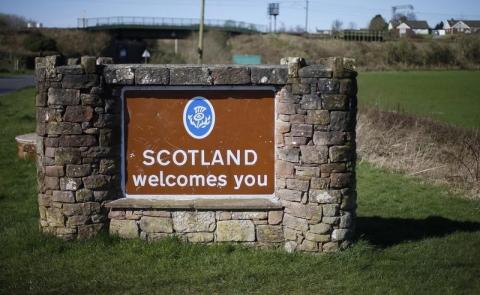Advertisement
Formal Countdown Begins For Scottish Vote That Could Break Up United Kingdom
EDINBURGH (Reuters) - The formal campaign for a Scottish independence vote that could break-up the United Kingdom began on Friday, although polls currently show Scots are unlikely to choose to end the 307-year-old union with England.
Scottish nationalists hope the desire for independence, historical rivalry and what they say has been centuries of mismanagement by far-off leaders in London will drive Scots to vote for secession in the Sept. 18 referendum.
Britain's main politicians have united against a breakaway, issuing pleas for unity and warnings about the economic costs of independence to the 4 million Scottish resident voters over the age of 16 who can participate.
Polls show Scots are unlikely to vote to break the union, with roughly 40 percent against independence and 30 percent in favor. But there are still enough undecided to swing the vote.
"The 'No' to independence campaign has held a lead and has done throughout most of the polling," said Tom Mludzinski, head of political polling at ComRes consultancy. "It's been narrowing recently, but it's still nowhere near enough if independence is going to win."
He added: "we're still a few months away, and if it's similar to general elections, many people do make up their minds in the last month or few weeks. So things could change."
The formal start of campaigning places limits on spending to 1.5 million pounds ($2.5 million) for each camp. But the pro-independence "Yes Scotland" or pro-Union "Better Together" side will get free airtime for campaign broadcasts.
UNITED KINGDOM?
Oil-rich Scotland accounts for about one-tenth of the United Kingdom's gross domestic product, and to lose it could weaken British diplomatic clout and raise questions over the UK's permanent seat on the U.N. Security Council.
Money has loomed large over the debate, with both secessionists and unionists trying to persuade voters that their prosperity is on the line.
The Scottish government, led by the secessionist Scottish National Party (SNP), wants to put an end to direct control from Westminster while keeping what it describes as "joint assets" such as the pound and the monarchy.
Prime Minister David Cameron's Conservative-led UK coalition government and the opposition Labour party have argued Scotland is richer and more powerful as part of the United Kingdom. All major UK-wide political parties have said no to sharing the pound after independence.
The government in London has floated the prospect of more autonomy should Scots vote against independence. Scotland has had a devolved parliament since 1999.
The SNP has used the devolved parliament as a platform to raise its profile, arguing that even with devolution Scotland would have to help pay for Britain's nuclear deterrent, over which Scots have no direct say.
"We are rich in resources and rich in people. This is a once-in-a-lifetime opportunity to take responsibility for our own destiny and to make our own decisions," actor and director David Hayman said at a "Yes Scotland" event on Friday.
"I would urge everybody, especially those who have yet to make up their minds, to have the confidence to say Yes."
By contrast, Blair McDougall, campaign director of Better Together, said: "A vote to stay in the UK in September is a vote ... for the strength, security and stability that comes from being part of the bigger UK."
Scottish First Minister Alex Salmond says independence - and control of a share of Britain's North Sea oil - would place Scotland among the world's richest countries.
Britain disputes this, however, saying that projections of an independent Scotland's wealth simply reflect how it benefits as part of the union.
Britain said there was a 1,400 pound "UK dividend" from staying in the United Kingdom, while Salmond has valued the "independence bonus" at 1,000 pounds.
(Editing by Jeremy Gaunt)



















Add new comment